- Home
- Captain W E Johns
03 Now To The Stars Page 9
03 Now To The Stars Read online
Page 9
'Had you torn it going up it's hardly likely you would be here now, my boy,' asserted Toby. 'You would have dropped off the tree like an over-ripe apple, straight into the mouths of those ugly devils watching you.
You must have pricked it coming down.
Luckily it was only a small puncture or nothing could have saved you. By the time we had got you into the pressurized cabin you had so swollen into your suit that we could hardly get at you. Feeling all right now?'
'A bit giddy, that's all,' answered Rex. 'My eyes are a bit blurry.'
don't wonder. Another minute and they'd have popped out. Don't worry.
They'll soon adjust themselves.'
The Professor stepped in, speaking seriously. 'In moments of excitement it is easy to forget that in airless conditions one is entirely dependent on one's clothing. Without air, and the artificial pressure it provides, swift death is inevitable. Let no one forget that.'
After his narrow escape Rex was sure he never would forget it.
'Let us move off,' Vargo,' said the Professor. 'No useful purpose is to be served by staying here any longer.'
The crew took their places at the controls. Borron gave his usual orders.
The ship quivered, otherwise it did not move. Another order and the quiver stopped. The crew looked at each other. Something seems to be wrong,' said Vargo. He went to the window and looked out. 'The legs have sunk into the sand,' he explained, calmly. The floor is almost level with the ground.'
'But haven't we enough power to pull the ship out of the ground?' asked the Professor, in the silence that followed Vargo's statement.
'We have no power at all,' returned Vargo. The exhaust ends of the energy tubes are blocked by the sand.'
'If you turn on full power it might blow them clear,' suggested Tiger.
'With no exhaust outlets it might blow the ship to pieces,' said Vargo simply.
As in other dangerous situations Rex noticed that the crew showed no signs of fear.
'What's to be done?' inquired the Professor.
Some of us will have to go out and dig the power tubes clear of sand,'
said Vargo. 'It's the only way. And we had better make haste or it will be impossible. If, as it seems, we are in quicksand, the ship will be sinking deeper every minute.'
At the idea of being trapped on this beastly place once more Rex's stomach seemed to go dovvii like a lift. Not that it mattered much where they ended up if they could never get back to Earth. He got to his feet as some of the others went into the airlock chamber, but realizing that with a damaged suit he could not go out he took it off, whereupon one of the crew took it from him and set about repairing it with equip-ment carried for the purpose. He could hear scraping going on under the ship and from time to time it shook slightly as if attempts were being made to lift it.
It seemed a long time before Borron came in and went to the controls. He applied the energy, and Rex, to his un-speakable relief, felt the ship move. Outside, clouds of sand swirled, showing that the tubes were clear.
Then the inner door of the airlock opened and those who had gone out came in.
A moment later, through his window, Rex saw the horizon begin to fall away, and knew that the Tavona had resumed its flight. That, at least, was something to be thankful for, he told himself; but they were still lost in the great open spaces of the Solar System. At least, he could only hope that they were still in their own group of planets, for had they got outside it, it was unlikely that they would ever see Min°, much less Earth again.
I 0 Strange sanctuary
it is hardly surprising that by this time Rex's enthusiasm for space exploration had declined considerably. All he wanted now was to get home, or at any rate back to Mino with its simple civilization; or better still, to Earth's next-door neighbour, Mars, which would almost seem like home. None of the worlds he had seen in his travels were to be compared with them.
The explorers, he thought, now knew what they had set out to discover.
Most of the planetoids of any size had developed life in one form or another, usually unpleasant and always different; which suggested that the theory assigning all life to a common stock was wrong, and its alternative, which was that every world had produced life suitable to its conditions, was right. Just as they themselves would find it hard, if not impossible, to keep alive on most of these bodies, so any form of Life they had seen, removed from its home, would probably die. They had all the evidence they needed, and the Professor could now spend the rest of his life working out why men on one planet should be giants, and on another, pygmies. It was a strange thought that should he find the answer it might be within his power to produce giants and dwarfs on Earth.
But before he could do that they would have to get there, and with their air supply and provisions shrinking daily their chances of succeeding in this were far from bright.
Vargo and Borron spent most of their time studying the stars; arid it might be thought that as they were familiar with them they would have no difficulty in fixing the position of the ship. Actually, as Vargo explained, it was their own position that prevented this. They were in the middle of the vast system of planetoids, some thousands of which had been observed, and given names or numbers, by astronomers on Earth. It was now known that the total number was far greater. They were not fixed stars. Every one, in the inexor-able grip of gravity, had its own particular orbit, sometimes large, sometimes small. Some planetoids moved swiftly, some slowly.
Some were near to them, others far away. Then again, whether it moved under its own power or was impelled by gravity, the ship itself was moving through space at astronomical speed.
These factors made it almost impossible to recognize any particular star, or constellation of stars, from a distance, for reasons which are easily explained. From hour to hour all the host of bodies around the ship varied in magnitude - the scale used to determine the size and distance of a star by its brilliance. Thus, a small planetoid near the ship, in the full glare of the sun, might for a period appear to be a star of the first magnitude, only to diminish to a star of lesser magnitude as it proceeded on its orbit. Again, the brilliance of a plane-toid could depend on its composition. They had seen how Unkos had blazed out of all proportion to its size because it had been fused by heat to a mass of glass, and glass is a reflector. The same with Pallio, with its glittering icy surface.
Borron admitted frankly that short of dropping by accident on a globe that he was able to recognize, the only chance of fixing the ship's position was to get clear of the planetoids altogether and so obtain ant
=interrupted view of the well known Outer Stars. The trouble about that was the time it might take, not knowing from whence he was starting.
He had no idea of how far the blast of the exploding Nova had carried them. As far as recognition was concerned, he and his crew knew a great many of the planetoids by sight, provided they were close enough to see the physical features; but there were more that they had never seen. Like mariners on the oceans of the Earth their travels had been confined to regular routes, and once off the beaten track, so to speak, everything was new and strange. The Nova had thrown them off their course and they were now in an unknown sea of space.
Vargo said the danger of getting off course had always been recognized.
More than one ship of the Remote Survey Fleet had failed to return to base and this was thought to be the reason, although there was always a chalice of a ship being struck by a meteor. They knew this had happened on at least one occasion, for the ship had been found floating in space with a large hole right through it. The crew, who had not been wearing their spacesuits at the time of the accident, having no time to put them on must have died instantly. The ship had been towed home.
It was cold comfort that Borron himself had never before been lost.
However, as neither regrets nor complaints would help matters the atmosphere in the ship remained the same as it sped on its way seeking a way out of the difficulty
. It seemed to Rex that their position might well be likened to that of a sailing ship that had been blown off its course by a gale. There were islands in the oceans of water, and there were also islands in the sea of' space. The trouble was, there were too many of them. Several were surveyed during the next few days, but as they all turned out to be barren and airless no landings were made.
They had one remarkable experience during this period, and it astonished Vargo and Borron no less than the Professor, who said he had never considered such a possibility.
The temperature inside the ship suddenly increased, and Borron announced that it could only be due to skin friction on the outside. That meant they were passing through a belt of atmosphere of some sort, although there was nothing to be seen outside to confirm this. The chances were, he thought,
that it was most likely to be helium, argon, or carbon dioxide, as these were occasionally encountered. At the Professor's request he went into the airlock chamber to settle the ques-tion. He returned with a faint smile on his face to say that the atmosphere was a mixture with such a large proportion of oxygen that although it was thin, it was possible to breathe it. Unfortunately the pressure inside the ship was such as to prevent any from entering if he opened a valve.
That such a phenomenon could exist gave them something to talk about, and it was generally agreed -that it was another result of the Nova explosion. Some unlucky planetoid had lost its atmosphere in the blast, and sooner or later another would capture it.
So now we know why some planets have air and others haven't,' remarked Rex.
The Professor conceded that that seemed to be the answer.
But strange though this incident was it was soon to be forgotten in one more in the nature of a real old-fashioned adventure. It was one of those odd coincidences that it should happen so soon after Vargo had mentioned something of the sort.
The ship had for some time been heading for a star which at first, because it was dull, was thought to be small; but as they drew near they could see they had been mistaken. It was one of the largest they had seen. The dull reflection, de-clared Vargo, could only be the result of a cloak of vegetation or a thick belt of atmosphere. It turned out to be both.
There was even some slight cloud. There were several lakes and a watercourse connecting two of them. From even closer inspection the vegetation appeared, from its smoothness, to be grass or reeds. With these promises of comfortable con-ditions the ship dropped towards it, Borron admitting with reluctance that he had no recollection of having seen the place before.
The ship was still at about a thousand feet, its power in. reverse to check the fall, when a cloud of white smoke suddenly billowed upwards from some open ground near one of the lakes.
'Be careful, Borron,' warned Tiger. That looks like a volcano.'
`No,' disputed the Professor. The smoke from the crater of a volcano would be constant.
That which we can see has only just appeared. It looks to me as if a fire has just been lighted.'
Nothing more was said. Everyone watched with mounting interest, for if a fire had been lighted it could only mean that there were people there.
Moreover, there was reason to suppose that they were making a signal.
That this was in fact the case became evident when from a lower altitude it became possible to see figures round the fire, dancing and waving.
They appeared to be as normal as them-selves. Borron, however, was taking no chances, and held the ship off while he had a good look at them.
It was Toby who settled all doubts. Great Scott!' he cried. Isn't that a Flying Saucer over there, by the trees?'
'It is,' declared Tiger. It seems to be half on its side. Those trees have had some knocking about, too. Some have been snapped off short. It looks to me as if the place might have been hit by a thundering good storm.'
Borron, who, as usual, seemed to be unaffected by surprise or shock, put the ship down close to the fire. The men, there were eight of them, at once ran to it. Their clothes were in rags, but tall and fair they looked very much like Minoans. But the most important thing about them, from Rex's point of view, was that they wore no spacesuits. This meant quite definitely that the atmosphere was 'pure'.
Castaways for certain, by all that's wonderful,' cried Tiger. 'A slice of cake for them we came along,' said Toby, grinning.
'It might turn out to be a slice of cake for us as well - if they know where they are,'
returned Tiger.
Borron made a quick test of the atmosphere, although the pressure valve made the unusual recording that the air pres-sure outside the ship was greater than inside, and went out. The others followed in turn to find him in the centre of an excited little crowd and a babble of conversation. Rex knew not one word of the language being used, so he began to wonder who the strangers were. As physical specimens they were magnificent, perfectly proportioned and rather more heavily built than Lentoans or Minoans. His curiosity had to be restrained for some time, until Vargo was able to break away and tell them what it was all about.
In the meantime he looked about him, mopping perspiration from his face for the air was sultry, both hot and humid, although why this should be was not apparent. From the number of broken trees that lay about it was plain that there had been a storm of wind of great violence. Even now Rex occasionally felt a slight breeze on his cheek - something he had not experienced for a long time. He also saw some winged insects, including a tiny blue butterfly that looked remarkably like the common Summer Blue of Earth. He had another shock when he noticed some thistles, and a straight row of shrubs, obviously cultivated, bearing what appeared to be large tomatoes.
Tak-ing one thing with another it was evident that conditions on this unknown little world resembled those of Earth more closely than any others they had seen. This gave the visitors from Earth something to talk about until Vargo was able to tell them the story of the castaways. And an amazing tale it was he had to tell. This was the gist of it.
How long the men had been marooned was not easy to explain, for there was no appropriate measurement of time, but as Rex made it out it was a matter of years.
The Spacemen, as Rex had suspected, were not Lentoans or Minoans, but came from a wonderful world of great age, called by them Ando, far, far away. Rex was to get an idea of how far way when Vargo went on to explain that it was from this world that many people got their ships, the journey from Lentos to get one occupying more than a Lentoan sun-cycle of time.
These people, declared Vargo, were a very old civilization indeed, and had been building spaceships for so long that their origin was lost in the dim past. The Andoans were highly skilled in space travel, making voyages beyond belief. They knew the Solar System intimately, had surveyed every planet in it, and knowing the danger of interference with the natural order of things kept watch on scientific development. It was, in fact, to study the increasing number of explosions on Earth that this particular crew had been assigned.
There was noth-ing to fear from that, for the Andoans were men of peace.
This particular ship had reckoned to be away for a time equal to two years.
The trouble had occurred on the return journey when they had nearly collided with the planetoid which on Earth had been named Hermes. It had, they alleged, for no apparent reason extended the ellipse of its orbit, and in so doing may have interfered with other bodies. The result, it was thought, was the production of a small comet, previously unknown and therefore uncharted. They had seen it afar off, and, of course, had taken steps to avoid it; but it must have been travelling at tremendous velocity, casting stones from its tail over a wide area, and some of these had struck the ship.
The Captain, on sighting the comet, and realizing there might be some danger from it, had given orders for space-suits to be put on, and it was due to this precaution that there were any survivors.
Several red-hot stones had struck the ship and gone right through it, smashing instruments and killing three men, the Cap
tain and two of the crew. The second in command, who was also the navigator, had made for the nearest place known to him where atmospheric conditions made life possible in the hope of being able to put the ship in a state of repair sufficient for it to return to its distant base. It would be im-possible to do this if they were compelled to wear spacesuits all the time, and obviously they would not be able to take them off in a ship in which there was neither air nor pressure. To repair the ship turned out to be a long and difficult business, and they were still at work on it when another disaster overtook them. The little planet was struck by a mass of air; or it might be more correct to say that it picked up a belt of loose air and held it by gravitational attraction.
Either way the results were the same, the wind defying description. The visitors could see for themselves the damage that had been done by what was in effect, a tornado. The ship had been bowled over the ground by the blast into the position in which they now saw it, and was beyond repair.
Two more men had been killed and others injured.

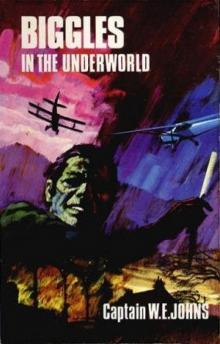 Biggles in the Underworld
Biggles in the Underworld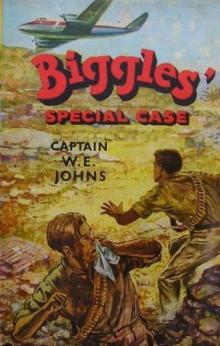 Biggles' Special Case
Biggles' Special Case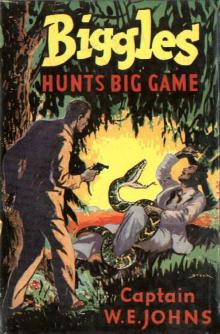 34 Biggles Hunts Big Game
34 Biggles Hunts Big Game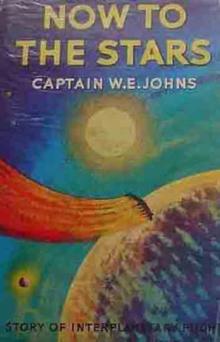 03 Now To The Stars
03 Now To The Stars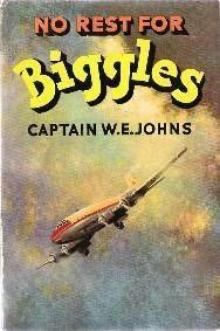 55 No Rest For Biggles
55 No Rest For Biggles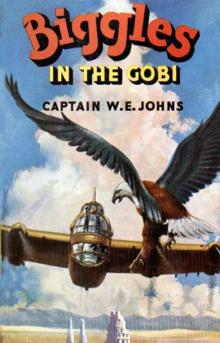 46 Biggles in the Gobi
46 Biggles in the Gobi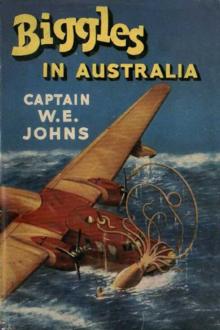 52 Biggles In Australia
52 Biggles In Australia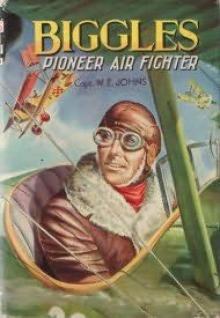 51 Biggles Pioneer Air Fighter
51 Biggles Pioneer Air Fighter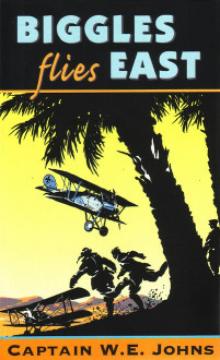 05 Biggles Flies East
05 Biggles Flies East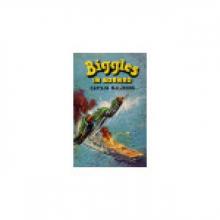 28 Biggles In Borneo
28 Biggles In Borneo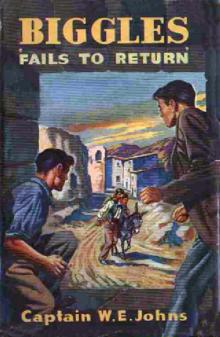 29 Biggles Fails to Return
29 Biggles Fails to Return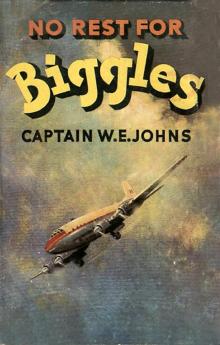 55 No Rest For Biggles (v2)
55 No Rest For Biggles (v2) Biggles Does Some Homework
Biggles Does Some Homework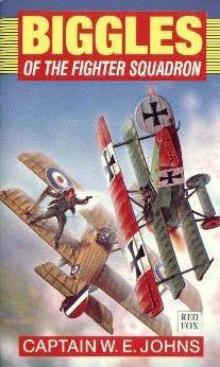 Biggles of the Camel Squadron
Biggles of the Camel Squadron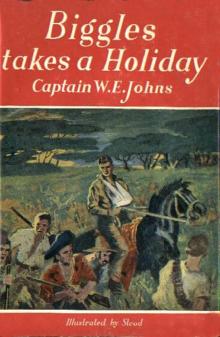 35 Biggles Takes A Holiday
35 Biggles Takes A Holiday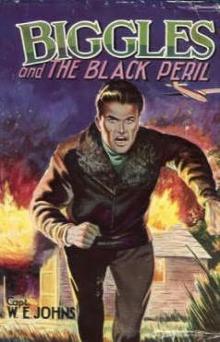 Biggles And The Black Peril (06)
Biggles And The Black Peril (06)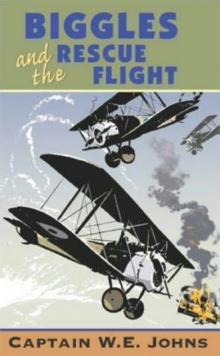 17 Biggles And The Rescue Flight
17 Biggles And The Rescue Flight Biggles Learns To Fly
Biggles Learns To Fly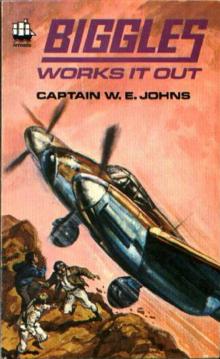 40 Biggles Works It Out
40 Biggles Works It Out 05 Biggles Learns To Fly
05 Biggles Learns To Fly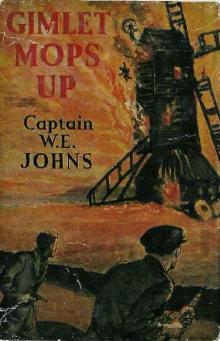 04 Gimlet Mops Up
04 Gimlet Mops Up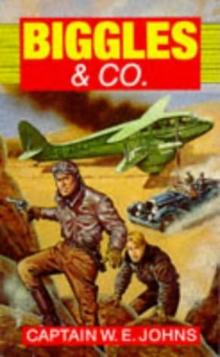 10 Biggles and Co
10 Biggles and Co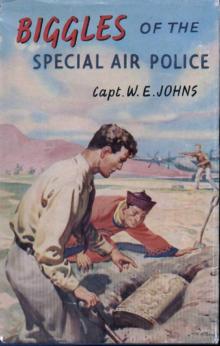 47 Biggles Of The Special Air Police
47 Biggles Of The Special Air Police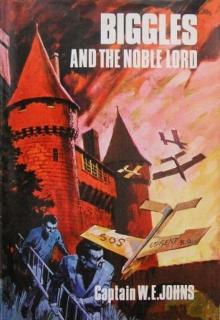 Biggles and the Noble Lord
Biggles and the Noble Lord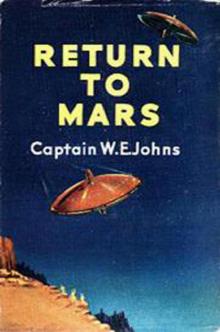 T2 Return To Mars
T2 Return To Mars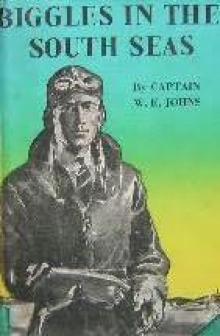 21 Biggles In the South Seas
21 Biggles In the South Seas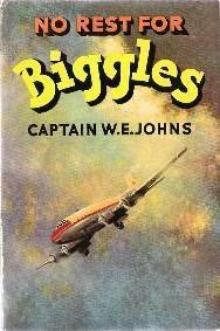 No Rest For Biggles
No Rest For Biggles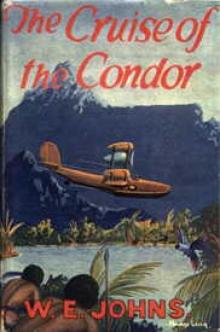 Biggles In The Cruise Of The Condor (02)
Biggles In The Cruise Of The Condor (02)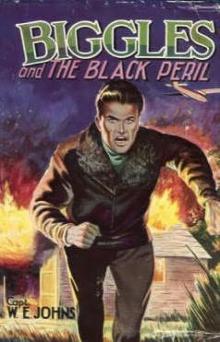 06 Biggles And The Black Peril
06 Biggles And The Black Peril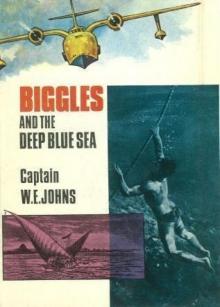 Biggles and the Deep Blue Sea
Biggles and the Deep Blue Sea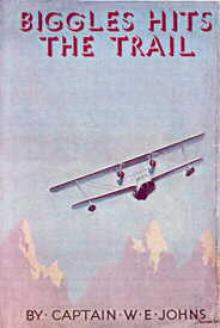 06 Biggles Hits The Trail
06 Biggles Hits The Trail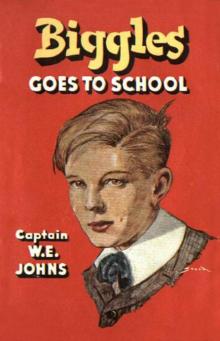 39 Biggles Goes To School
39 Biggles Goes To School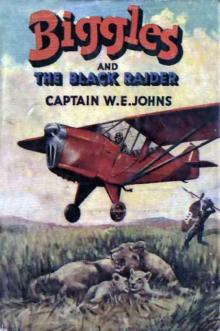 44 Biggles and the Black Raider
44 Biggles and the Black Raider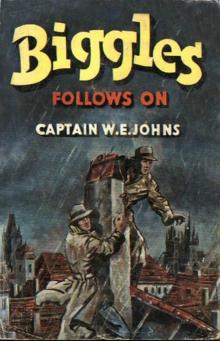 42 Biggles Follows On
42 Biggles Follows On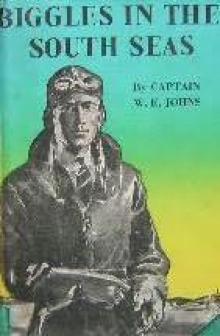 Biggles In the South Seas
Biggles In the South Seas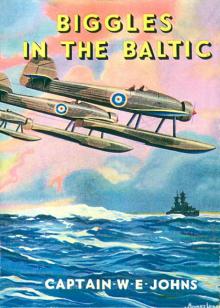 21 Biggles In The Baltic v3
21 Biggles In The Baltic v3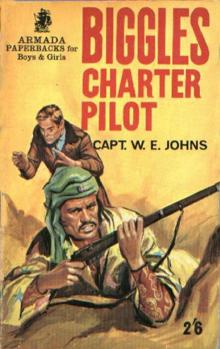 27 Biggles - Charter Pilot
27 Biggles - Charter Pilot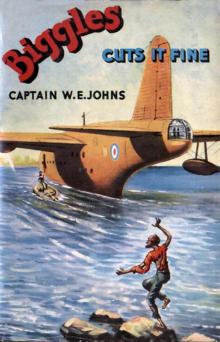 49 Biggles Cuts It Fine
49 Biggles Cuts It Fine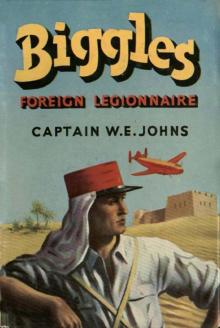 51 Biggles Foreign Legionaire
51 Biggles Foreign Legionaire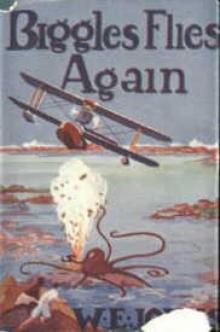 04 Biggles Flies Again
04 Biggles Flies Again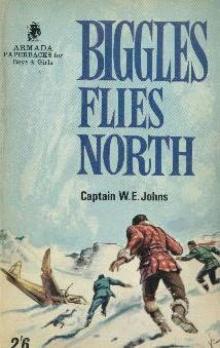 16 Biggles Flies North
16 Biggles Flies North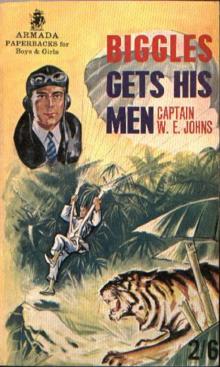 37 Biggles Gets His Men
37 Biggles Gets His Men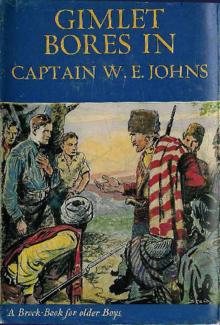 07 Gimlet Bores In
07 Gimlet Bores In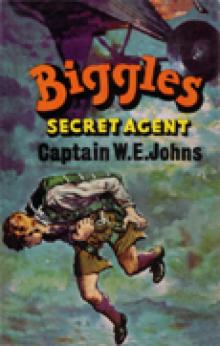 19 Biggles Secret Agent
19 Biggles Secret Agent 32 Biggles In The Orient
32 Biggles In The Orient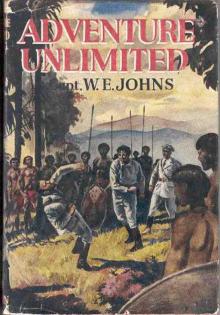 Adventure Unlimited
Adventure Unlimited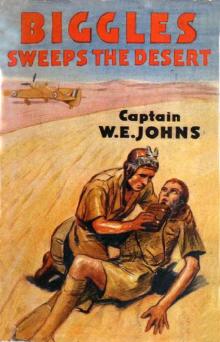 26 Biggles Sweeps The Desert
26 Biggles Sweeps The Desert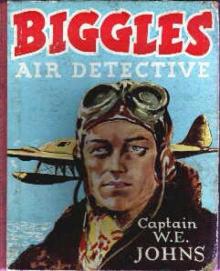 Biggles Air Detective (43)
Biggles Air Detective (43) 36 Biggles Breaks The Silence
36 Biggles Breaks The Silence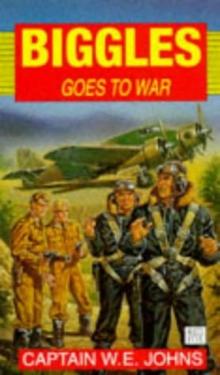 14 Biggles Goes To War
14 Biggles Goes To War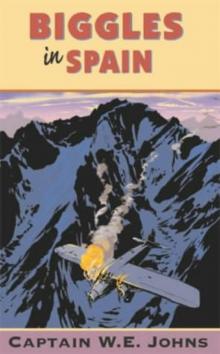 18 Biggles In Spain
18 Biggles In Spain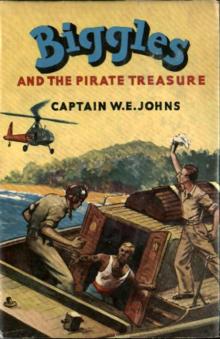 50 Biggles and the Pirate Treasure
50 Biggles and the Pirate Treasure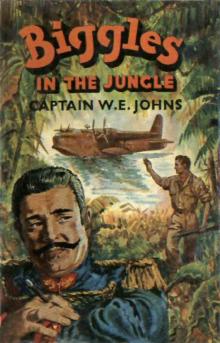 25 Biggles In The Jungle
25 Biggles In The Jungle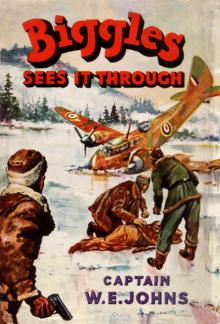 23 Biggles Sees It Through
23 Biggles Sees It Through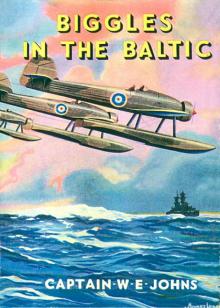 21 Biggles In The Baltic
21 Biggles In The Baltic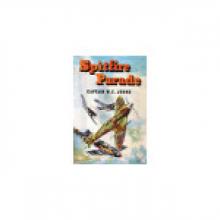 24 Spitfire Parade
24 Spitfire Parade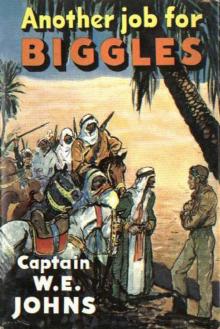 38 Another Job For Biggles
38 Another Job For Biggles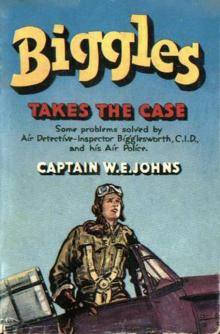 41 Biggles Takes The Case
41 Biggles Takes The Case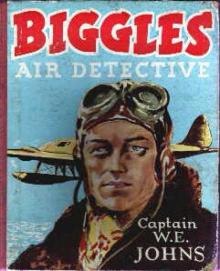 43 Biggles Air Detective
43 Biggles Air Detective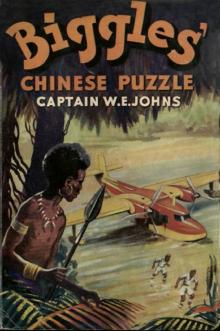 53 Biggles Chinese Puzzle
53 Biggles Chinese Puzzle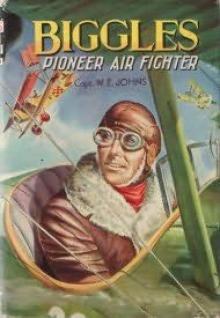 Biggles Pioneer Air Fighter (51)
Biggles Pioneer Air Fighter (51)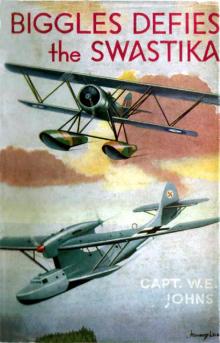 22 Biggles Defies The Swastika
22 Biggles Defies The Swastika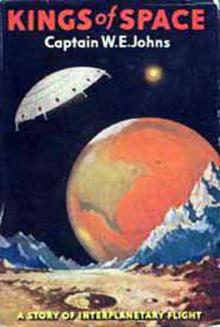 01 Kings Of Space
01 Kings Of Space